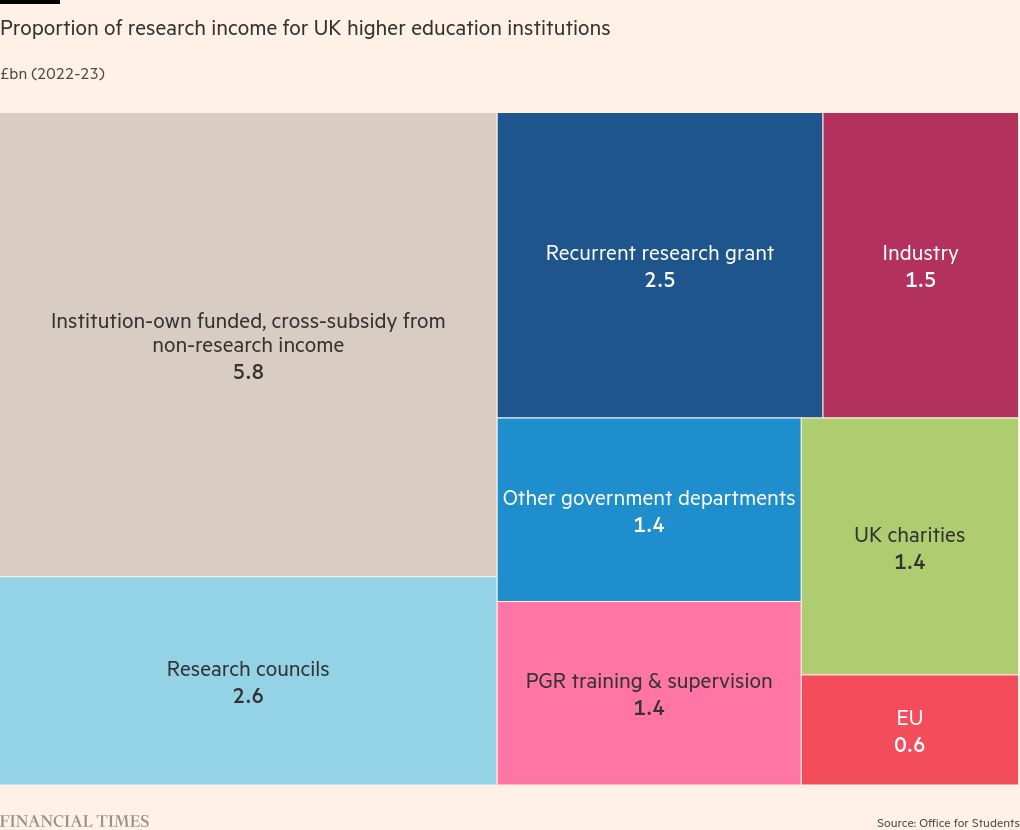
Unlock the Editor’s Digest for free
Roula Khalaf, Editor of the FT, selects her favourite stories in this weekly newsletter.
Britain must overhaul its funding for frontier science to focus on a handful of critical technologies if it wants to be a “country of the future and not the past”, according to a draft report by veteran Labour politician Lord Peter Mandelson.
UK innovation efforts are spread too thinly, over-reliant on universities and need to be part of a wider industrial strategy, Mandelson argues in a wide-ranging study on national research efforts due to be published this month by the lobby group Universities UK.
His diagnosis comes as Labour grapples with how to keep UK higher education globally competitive, as the sector faces a funding crisis caused by frozen tuition fees and a sharp drop-off in lucrative international postgraduate students.
Britain is also competing with bigger economies that are able to put more resources into innovation.
“In key frontiers like quantum science or synthetic biology, UK institutions are producing less groundbreaking research than we ought to be,” Mandelson told the Financial Times.
“Part of the solution is to accept that the UK is a mid-sized country — we are not the US or China — and we cannot be good at everything. If we duck the hard choices about where to concentrate our resources, we will lose our edge,” he added.
The new Labour administration has promised to kick-start the economy by investing in new technologies and the transition to net zero via a £7.3bn national wealth fund as part of its five “missions” for government.
However, the government’s dealings with the scientific community had an awkward start with the decision last month to scrap £1.3bn of support pledged by the Conservatives for technology projects, including an £800mn supercomputer at Edinburgh university.
The analysis of the UK research performance forms one of eight chapters in a wide-ranging new “blueprint” for the sector by UUK. Other contributors include Andy Haldane, the former Bank of England economist, and CBI chief Rain Newton-Smith.
Every £1 of public spending on research and development in the UK stimulates between £1.96 and £2.34 of private spending, according to government figures, yet universities have registered rising deficits on research activities that reached £5.3bn in 2022-3, says the report, which has been seen by the FT.
“The system creates a paradox where universities lose more money the more successful they are at bidding for grants, and this only advantages institutions which can sustain loss-leading activity,” the findings warn.
University leaders at the annual UUK conference earlier this month urged the government to find more cash for the sector, despite a warning from education secretary Bridget Phillipson that there would be “no quick fixes” ahead of the October 30 Budget.
Tim Bradshaw, chief executive of the Russell Group of research universities, told the Financial Times that “ambitious investment” in R&D was critical to delivering the government’s mission to kick-start economic growth.

“A longer-term funding settlement for R&D — including for fundamental research which underpins the UK research base — will also be vital to maintain the UK’s international competitiveness,” he added
The UUK blueprint, which the sector hopes will form the basis for a new discussion with government about policy towards the HE sector, argues for a multipronged strategy. It says universities should receive increased government research funding, while seeking greater contributions from charity and industry partners and extracting more value from commercialisation of research through university spin-off companies.
Mandelson pointed to Singapore as an example of a country with a strategy that had “concentrated on a small number of fields where they can demonstrate excellence”.
“We will not shift the growth dial if we do not get universities, government and business working in harmony to build out new markets and industry based on Britain’s research base,” he said.